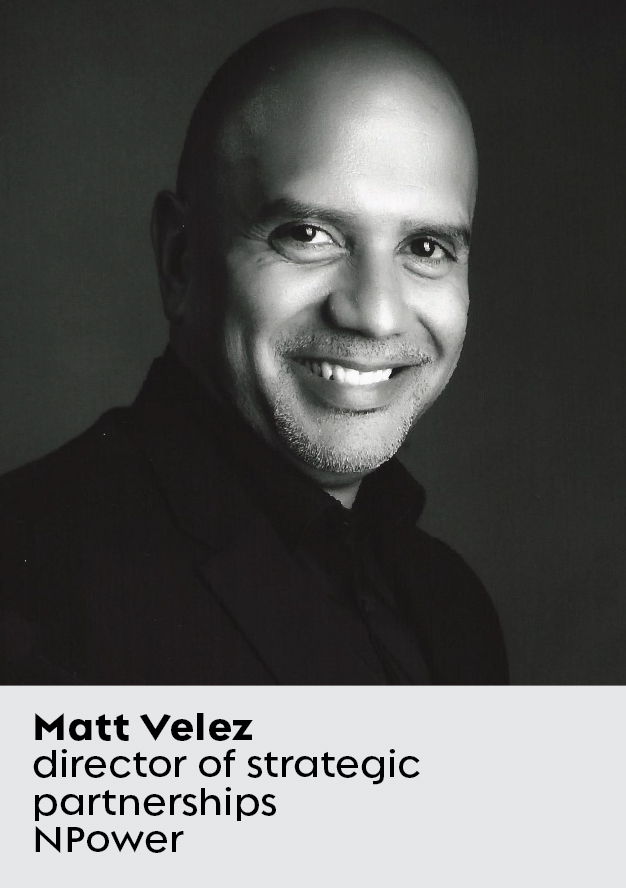How NPower Creates Pathways to Prosperity
The tech-training nonprofit blends education and partnerships to place students in jobs.
Fahad Choudhury never intended to end up in high tech—let alone lead cybersecurity response at a major bank.
A Bengali transplant, he’d spent most of his life in the Bronx. By 2017, he was in his final semester studying finance but was growing increasingly disenchanted with his chosen field.
 For years he’d nurtured a side obsession with computers. So when a friend told him about a free tech training program for minority and underserved communities—promising a bright future in the exploding tech world—Choudhury practically threw down his accounting books and ran to enroll.
For years he’d nurtured a side obsession with computers. So when a friend told him about a free tech training program for minority and underserved communities—promising a bright future in the exploding tech world—Choudhury practically threw down his accounting books and ran to enroll.
Today, 27-year-old Choudhury is a vice president at Citi, the multinational investment bank and financial services company with 210,000 employees and more than $2.26 trillion in assets. He plays a critical role in the company’s security operations center (SOC), where he and a team of incident responders are charged with keeping private company and customer records safe.
Tanium’s Cyber Hygiene Assessment: An actionable path to better endpoint management and security
He wouldn’t be in that role if not for NPower, the nonprofit that guided him. “I owe them my start in IT,” says Choudhury. “If it wasn’t for their tech fundamentals and cybersecurity programs, I wouldn’t be here.”
Choudhury is not alone. Since launching in 2000, NPower has trained 6,000 students. Its goal is to create pathways to prosperity, to move low-income people to the middle class through tech training.
“What we’re doing is helping students get certifications that are relevant to the market,” says Matt Velez, a self-described “man of color” who emerged from New York’s housing projects to become director of strategic partnerships at NPower. “We wanted to create opportunities for individuals like myself who come from underserved communities and want to work—to learn—and have a passion for technology.”
Finding more skilled—and diverse—workers
Groups like NPower are key to solving two fundamental challenges facing nearly every industry and government agency: a severe skills shortage, which is a crucial factor in preventing cybercrime, and a lack of diversity in tech hiring. This year’s ransomware attacks on businesses, infrastructure, and federal agencies have intensified the need to hire tech-savvy professionals from an expanded and nontraditional talent pool.
Information-security and engineering jobs are expected to grow by nearly a third between 2020 and the end of this decade, according to the Bureau of Labor Statistics. This year alone, 500,000 info-security jobs in the U.S. will go unfilled, according to estimates by the Aspen Institute’s Cybersecurity Group.
[Read also: How code.org is teaching the world’s school kids to code]
It’s not just a cybersecurity concern, either. As companies and government agencies continue to undergo massive digital transformation, there are simply too few students with the skills needed to offset an anticipated shortfall of nearly 3.4 million technical jobs in the U.S. by 2022. In a CNBC survey of tech leaders, 44% of respondents considered the filling of technology roles the biggest risk they face in the coming year.
Velez and his team are working hard to fill those ranks. And they’re doing it by partnering with private companies like Tanium to provide a steady pipeline of skilled workers.
Partnerships to prosperity
NPower is a 100% tuition-free program with half-day courses offered in the spring and fall. Applicants do not have to pass an entrance exam, but do undergo a series of interviews to assess their aptitude for the program. Students typically start by enrolling in the baseline Tech Fundamentals class, after which they can advance to CompTIA cybersecurity and cloud-computing Amazon Web Service certification training.
Programs like NPower are all about access. Too many people don’t know how to get into high tech.
NPower’s charter has evolved over time. Founded with funding from Microsoft, JPMorgan Chase, and Accenture, the training program initially aimed to bring talent into the nonprofit world (thus the N in its name). Eventually, its mission grew to include training for military veterans and young adults of all genders, races, and ethnicities.
Lately, NPower has been invested in bringing underrepresented women of color, who have been hard hit by the pandemic, into the tech workforce. And it regularly forges partnerships to help diversify the IT workforce of companies in multiple industries. For example, NPower partners with Tanium on its 2% corporate Giving Pledge and its Talent of Tomorrow giving program.
“Organizations like NPower are playing an important role in filling today’s tech and cybersecurity skills gap,” says Andrew Flint, regional vice president of sales at Tanium. “We believe in bringing prosperity and career advancement to military veterans, young adults, and underserved communities.”
[Read also: Supporting the next generation of women in cybersecurity]
Citi and NPower, meantime, recently announced an initiative to create more high-tech job opportunities for women of color. Bank of America (BofA) granted $4.2 million this year to NPower and Urban Alliance to connect students “from communities of color” to technical skills and jobs in banking and other fields. Since 2018, BofA has hired more than 10,000 workers from low- and moderate-income neighborhoods by working with nonprofits like NPower.
Part of what’s driven NPower’s relevancy is its determination to be more than just a trade school. What sets it apart, says graduate Choudhury, is the professional career-building elements of the curriculum, which force students to apply online classroom learning to real-world situations.
“Once every two weeks or so, we would go to these big corporations downtown,” he recalls. “We’d have these networking events to learn what the companies did and what it would take to get technology jobs with them. That allowed us to take the technical knowledge that was taught in class and think about how we’d apply it in the field—to align to experiences and requirements out there right now.”
[Read also: Inside Tanium: summer internship leads to full-time position with cloud engineering]
Through those networking events, as well as its constant work with funders and employers, NPower says it has helped 81% of its graduates get jobs or continue their education. It’s also set a goal to place a minimum of 15,000 students in jobs across its programs and geographic footprint by 2023. (NPower has locations in New York, Texas, California, Maryland, New Jersey, Missouri, Michigan, and Toronto.)
“Programs like NPower are all about access,” says Velez.
“Too many people,” he adds, “don’t know how to get into high tech. They might be working at a Starbucks, a grocery store, or flipping burgers somewhere. And they just don’t have a clue of how to find their way—until they hear about us. We offer the training and guidance they need to break into IT.”








